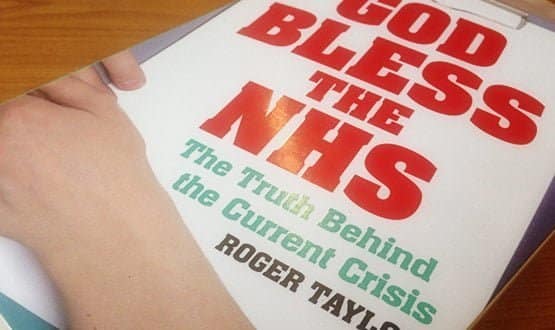Everybody loses, everybody wins
- 21 March 2013

In his new book, God Bless the NHS: the truth behind the current crisis, Roger Taylor of Dr Foster argues that politicians and defenders of the NHS have been reluctant to tell the public some home truths about it.
In particular, he argues, they are reluctant to admit that the cost of medical advances is putting a fundamental strain on the NHS, and that some of its organisations are very much better than others – even when scandals such as Mid Staffs make this obvious.
As a result, he argues that while policy makers can see the need to involve doctors in financial decisions and to reconfigure hospital services, NHS staff and members of the public are baffled by or openly hostile to them. Yet, he concludes, there is a way forward.
"Many people agree in principle that the NHS needs to change; but little in the current reform agenda really resonates with the public.
You do not hear people in the pub complaining that non-one has shut down the dreadful local cancer clinic because of its poor outcomes, or bemoaning the shocking lack of engagement by the medical profession in fixing the financial problems facing the NHS.
This is the tension that underlies the political debate. Those opposed to reform face economic forces which, like tectonic plates, tend, in the long-run, to crush anything that stands in their way. Those in favour of reform face an indifferent or often hostile response from large sections of the profession and the public.
The result is a sort of policy ‘groundhog day’, in which governments enact reforms that fail to get traction out in the real world and fail to produce the hoped for improvements. They respond to this with a new set of reforms that appear to the untrained eye to be little more than a rehashing of the last set of reforms.
Yet, we fear that the system is not working as it should. Too often it lets patients down. It is failing to achieve the right balance of responsibility and authority between doctors and patients.
Somehow, we have reached a point where the NHS has the power to destroy a brain tumour with radiation and to replace a malfunctioning heart with an artificial one. Yet, at the same time, it is capable of leaving a patient crying in agony all night because there is nobody to provide pain control; or to let them die because of an error on a prescription.
So let me describe an ideal scenario. And let me begin with what will, in time, happen as a result of having access to your medical record.
From your phone, tablet or computer you will be able to read everything that has been noted or done about your health in a form that is understandable. It will describe the history of your symptoms, diagnoses, prescriptions and treatments.
You will be able to add to it, indeed, you will be expected to, updating information about your symptoms and your state of health. You will be able to share it with others to alert them to concerns. You will use it to seek advice from both professionals and patients.
If you want to, you will be able to feed it into applications that generate lifestyle recommendations, or identify possible issues with your regimen, such as drug interactions. It will detail any agreed programme of care, and any steps you have agreed to take to look after yourself.
You will use it to check whether these things are happening, to see what needs to be arranged, to book appointments, to make sure that test results have been received and viewed before you go to see the doctor, and to order repeat prescriptions or additional supplies.
You may not have anyone that you would describe as ‘your doctor.’ However, you will have access to a medical service that knows who you are, and can put you in contact with whoever you need, by phone, online or in person, twenty four hours a day, seven days a week.
That might sound like a lot of work for the patient. Of course, many patients will not be in a position to do any of these things. But growing numbers will. For those that can, there will be a trade-off; more work on their part, but more control over the care they do receive.
For society, the trade-off is a little different; some people will be asked to do more for themselves, so that those who need it most can get much more in the way of dedicated support.
As individuals start to have more opportunity to determine the degree to which they are willing to take risks – whether that be risking experimental treatments to try to prolong life, or risking refusing treatment to enjoy what remains of life – carers and health services will become better at understanding what constitutes a good outcome, and how that can be brought about.
This means fewer people will undergo treatments that they would have refused had they properly understood what was proposed and felt able to say no. It also means fewer people being given inadequate treatment and having their untimely end written off as something that was bound to happen.
These changes and, again, technology, will affect the way in which health services are arranged. More care will happen in your own home, where telemedicine will reach the point of being a useful tool. More diagnostic tests and treatment will be available at local clinics. Hospitals will be fewer, larger but better, and medical teams will be increasingly specialised with greater depth of expertise.
‘Never events’ and medical errors will become things that really are expected never to happen. Failures in care will be monitored and will not be tolerated. The number of avoidable deaths – however measured – will fall.
Rationing of healthcare will not end. But if these changes result in patients being healthier and health services more effective in their use of resources, the pressure to ration services will reduce.
If we make sure that we only provide those treatments that fully informed patients want [and provide them in the organisations most effective at carrying them out] we may find that we have the resources to make sure that no patients are denied the treatment they need.
That may sound overly optimistic when we look at the current state of information technology in healthcare, but the prize of getting this right is so great that it seems to me inevitable that we will get there.
The NHS is often accused of being too big, but I think that having a national system with the ability to introduce changes across the whole country and a common approach to the information and record keeping is a huge advantage.
More importantly, having a national organisation that encapsulates an ideal – an ideal to which the population is committed and one that will do whatever is necessary to support – gives us the firmest foundations on which to build. We are still waiting for a leap forward in our health services. But we have good reason to hope."
God Bless the NHS: the truth behind the current crisis is published by Faber and Guardian Books, and is available in print and e-book formats.




